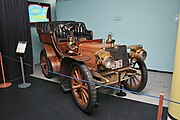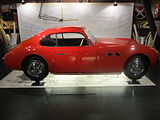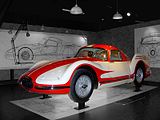
Abarth & C. S.p.A. is an Italian racing and road car maker and performance division founded by Italo-Austrian Carlo Abarth in 1949. Abarth & C. S.p.A. is owned by Stellantis through its Italian subsidiary. Its logo is a shield with a stylized scorpion on a yellow and red background.

The Superga air disaster occurred on 4 May 1949, when a Fiat G.212 of Avio Linee Italiane, carrying the entire Torino football team, crashed into the retaining wall at the back of the Basilica of Superga, which stands on a hill on the outskirts of Turin. All thirty-one people on the flight died.

Itala was a car manufacturer based in Turin, Italy, from 1904 to 1934, started by Matteo Ceirano and five partners in 1903.

The Fiat Turbina was a gas turbine-powered concept car built by Italian car manufacturer Fiat in 1954.
The Turin Motor Show was an auto show held annually in Turin, Italy. The first official show took place between 21 and 24 April 1900, at the Castle of Valentino, becoming a permanent fixture in Turin from 1938 having shared it with Milan and Rome until that time. From 1972, the show was held biannually and in 1984, it moved into Fiat's shuttered Lingotto factory.
Conte Carlo Biscaretti di Ruffia was an Italian artist, industrial designer, journalist and automobile enthusiast.

The SCAT was an Italian automobile manufacturer from Turin, founded in 1906 by Giovanni Battista Ceirano.
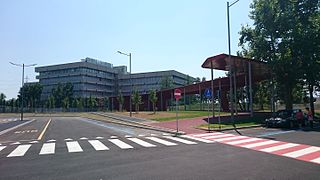
Museo Storico Alfa Romeo is Alfa Romeo's official museum, located in Arese (Milan), and displaying a permanent collection of Alfa Romeo cars and engines.
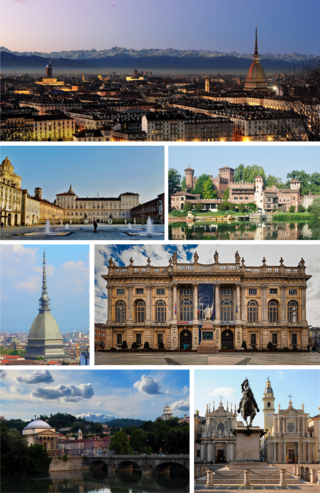
Turin is a city and an important business and cultural centre in Northern Italy. It is the capital city of Piedmont and of the Metropolitan City of Turin, and was the first Italian capital from 1861 to 1865. The city is mainly on the western bank of the Po River, below its Susa Valley, and is surrounded by the western Alpine arch and Superga Hill. The population of the city proper is 847,287 while the population of the urban area is estimated by Eurostat to be 1.7 million inhabitants. The Turin metropolitan area is estimated by the OECD to have a population of 2.2 million.

Fiat Automobiles S.p.A. is an Italian automobile manufacturer, formerly part of Fiat Chrysler Automobiles, and since 2021 a subsidiary of Stellantis through its Italian division Stellantis Italy. Fiat Automobiles was formed in January 2007 when Fiat S.p.A. reorganized its automobile business, and traces its history back to 1899 when the first Fiat automobile, the Fiat 4 HP, was produced.

The Museo Nazionale della Magna Grecia, Museo Archeologico Nazionale di Reggio Calabria or Palazzo Piacentini is a museum in Reggio Calabria, southern Italy, housing an archaeological collection from sites in Magna Graecia.
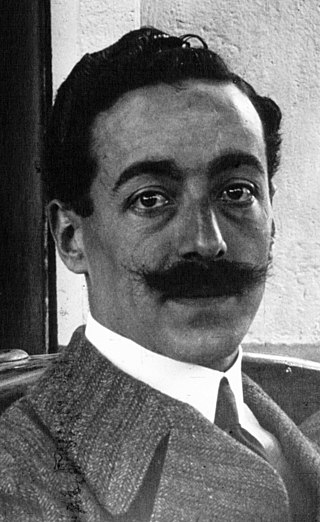
Alessandro Umberto Cagno, Umberto Cagno, nicknamed Sandrin was an Italian racing driver, aviation pioneer and powerboat racer.
The following is a timeline of the history of the city of Turin, Piedmont, Italy.

Società Torinese Automobili Rapid, also known as S.T.A.R. and Rapid, was an Italian car manufacturer founded by Giovanni Battista Ceirano in Turin in July 1904. Rapid was its trademark. In 1921 it was acquired by the S.P.A. company that had been founded by Giovanni Battista's brother Matteo Ceirano, and which, in 1925, was taken over by Fiat.
The Giro d'Italia automobilistico was an automobile race around Italy, historically first held in 1901, then reinstituted as annual event between 1973 and 1980, resurrected for 1988 and 1989, and again in 2011. Both in its historical and modern iterations the Giro d'Italia was inspired by its French equivalent, the Tour de France Automobile.
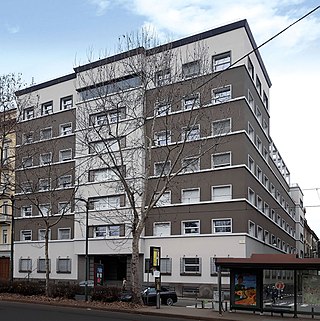
The Palazzo Gualino is an office building in Turin, Italy built in 1928–30 for the entrepreneur Riccardo Gualino by the architects Gino Levi-Montalcini and Giuseppe Pagano. It is an important example of early Italian rationalist architecture. The building was used for offices first by Gualino, then by Fiat and finally by the city of Turin, who sold it to a real estate developer in 2012. A project to convert the office building into high-end apartments was begun in 2012, but was abandoned in 2015.

The following outline is provided as an overview of and topical guide to Turin:
Stellantis Heritage is a department established to protect and promote the historic legacy –both automotive and archival– of the Italian brands Alfa Romeo, Fiat, Lancia and Abarth. It was founded in Torino in 2015 to coordinate all the activities which, up to that moment, had been conducted individually by the brands to promote their historical and cultural heritage.

The Polo del '900 is a cultural centre of Turin, that hosts the seats of 26 partner institutions. The centre is housed in the so-called Quartieri Militari of the Quadrilatero Romano, a juvarrian compound, in the Palazzi San Celso and San Daniele, built on the design of Filippo Juvarra, which house the library, the archive, the areas for events, exhibitions and performances, classrooms and the permanent exhibitions of the Museo diffuso della Resistenza, della deportazione, della guerra, dei diritti e della libertà.



